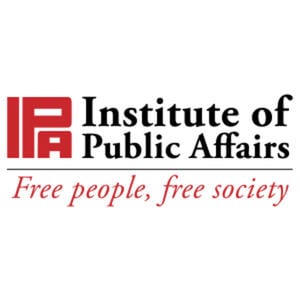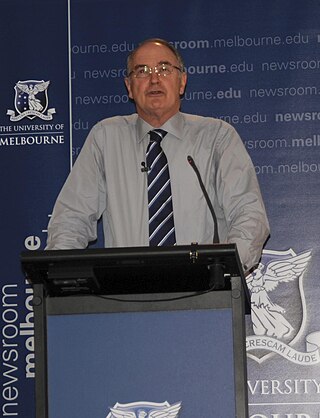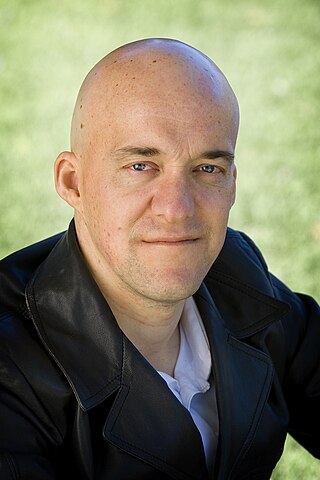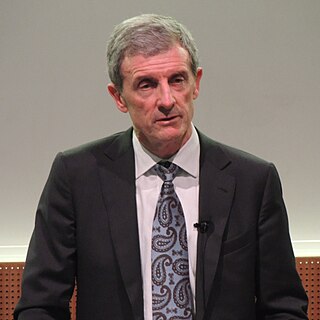
The Institute of Public Affairs (IPA) is a conservative non-profit free market public policy think tank, which is based in Melbourne, Victoria, Australia. It advocates free-market economic policies, such as privatisation, deregulation of state-owned enterprises, trade liberalisation, deregulation of workplaces, abolition of the minimum wage, criticism of socialism, and repeal of Section 18C of the Racial Discrimination Act 1975. It also rejects large parts of climate science.
Haydon Manning is an Australian political scientist and Adjunct Professor with the College of Business, Government and Law at The Flinders University of South Australia.

Hugh Matheson Morgan, is an Australian businessman and former CEO of Western Mining Corporation. He was President of the Business Council of Australia from 2003 to 2005. The Howard government appointed him to the board of the Reserve Bank of Australia in 1996, where he remained until 2007. He also was the Founding Chairman of Asia Society Australia.
The Australia Institute is an Australian public policy think tank based in Canberra, with offices also in Hobart and Adelaide. Since its launch in 1994, it has carried out research on a broad range of economic, social, and environmental issues. The Australia Institute states that it takes a bipartisan approach to research, but has been described as a "progressive" or "left-leaning."
Jennifer Marohasy is an Australian biologist, columnist and blogger. She was a senior fellow at the free-market think tank the Institute of Public Affairs between 2004 and 2009 and director of the Australian Environment Foundation until 2008. She holds a PhD in biology from the University of Queensland. She is sceptical of anthropogenic global warming and co-authored a peer-reviewed paper in GeoResJ suggesting that most of the recent warming is attributable to natural variations, a view disputed by climate scientists.

The energy policy of Australia is subject to the regulatory and fiscal influence of all three levels of government in Australia, although only the State and Federal levels determine policy for primary industries such as coal. Federal policies for energy in Australia continue to support the coal mining and natural gas industries through subsidies for fossil fuel use and production. Australia is the 10th most coal-dependent country in the world. Coal and natural gas, along with oil-based products, are currently the primary sources of Australian energy usage and the coal industry produces over 30% of Australia's total greenhouse gas emissions. In 2018 Australia was the 8th highest emitter of greenhouse gases per capita in the world.

Mark Diesendorf is an Australian academic and environmentalist, known for his work in sustainable development and renewable energy. He currently researches at the University of New South Wales, Australia. He was formerly professor of environmental science and founding director of the Institute for Sustainable Futures at the University of Technology, Sydney and before that a principal research scientist with CSIRO, where he was involved in early research on integrating wind power into electricity grids. His most recent books are The Path to a Sustainable Civilisation (2023) and Sustainable Energy Solutions for Climate Change (2014).

Ross Gregory Garnaut is an Australian economist, currently serving as a vice-chancellor's fellow and professorial fellow of economics at the University of Melbourne. He is the author of numerous publications in scholarly journals on international economics, public finance and economic development, particularly in relation to East Asia and the Southwest Pacific.

Nuclear power in Australia has been a topic of debate since the 1930s. Australia has one nuclear reactor (OPAL) at Lucas Heights, New South Wales, which is only used to produce radionuclides for nuclear medicine, and does not produce electricity. Australia hosts 33% of the world's proven uranium deposits, and is currently the world's third largest producer of uranium after Kazakhstan and Canada.
The Australian Environment Foundation (AEF) is a not-for-profit advocacy organisation. It has disputed the values of some mainstream environmental assertions, and also on occasion the evidence used to support those assertions. The AEF is climate-change-denying, pro-logging, pro-big business, anti-wind energy, and against the Murray-Darling Basin plan.

Greenhouse gas emissions by Australia totalled 533 million tonnes CO2-equivalent based on greenhouse gas national inventory report data for 2019; representing per capita CO2e emissions of 21 tons, three times the global average. Coal was responsible for 30% of emissions. The national Greenhouse Gas Inventory estimates for the year to March 2021 were 494.2 million tonnes, which is 27.8 million tonnes, or 5.3%, lower than the previous year. It is 20.8% lower than in 2005. According to the government, the result reflects the decrease in transport emissions due to COVID-19 pandemic restrictions, reduced fugitive emissions, and reductions in emissions from electricity; however, there were increased greenhouse gas emissions from the land and agriculture sectors.

Barry William Brook is an Australian scientist. He is an ARC Australian Laureate Professor and Chair of Environmental Sustainability at the University of Tasmania in the Faculty of Science, Engineering & Technology. He was formerly an ARC Future Fellow in the School of Earth and Environmental Sciences at the University of Adelaide, Australia, where he held the Sir Hubert Wilkins Chair of Climate Change from 2007 to 2014. He was also Director of Climate Science at the Environment Institute.

Energy in Sweden is characterized by relatively high per capita production and consumption, and a reliance on imports for fossil fuel supplies.

Public opinion on nuclear issues is the aggregate of attitudes or beliefs held by the adult population concerning nuclear power, nuclear weapons and uranium mining. Opinions vary very significantly across countries, and have significantly changed over time, with support declining mostly as result of widely publicized nuclear incidents, often presented in a distorted way, where the debate on climate change has boosted support for nuclear power as low-carbon energy source in many countries.

Tony Wood is an Australian businessman and Energy Program Director at the Grattan Institute. He has become a prominent spokesperson for the institute since his appointment in 2011, and has written 32 articles for The Conversation related to energy, climate change and energy policy. From 2002 to 2008 he was executive general manager of Origin Energy, where he held executive positions for a total of 14 years. Wood has declared interests as a shareholder of BHP Billiton and Origin Energy.

Tony Irwin is a nuclear engineer and technical director of Australian company, SMR Nuclear Technology. For three decades he worked commissioning and operating nuclear reactors in the UK for British Energy. He emigrated to Australia in 1999 and took a position with the Australian Nuclear Science and Technology Organisation (ANSTO), where he remained for ten years. Irwin chairs the Nuclear Engineering Panel of Engineers Australia and lectures at the Australian National University and University of Sydney on nuclear science. Irwin has a degree in electrical power engineering.
Anthony 'Tony' David Owen is an economist and academic, currently employed as Emeritus Professor in Energy Economics at University College London Australia. He was appointed to the position in July 2013, and was previously Academic Director of the School of Energy and Resources at its campus in Adelaide, Australia. He also held the Santos Chair in Energy Resources at the time. He previously held positions at Curtin University of Technology and the University of New South Wales, and worked as a consultant and visiting appointee in North America, Europe and Asia. In 2007 he chaired the Inquiry into Electricity Supply in New South Wales. Owen wrote a book entitled The economics of uranium, which was published by Praeger in 1985. Since then, Owen has written periodically on the possibility of nuclear power in Australia, including for the Committee for Economic Development of Australia in 2011. His academic papers have featured in peer-reviewed journals such as Energy Policy, Economic Record, Agenda and the Journal of Nuclear Research and Development. He also edited the book The Economics of Climate Change with Nick Hanley which was published by Routledge, London in 2004.
Benjamin "Ben" Heard is a South Australian environmental consultant and an advocate for nuclear power in Australia, through his directorship of environmental NGO, Bright New World.
Timothy John Stone, CBE is a British businessman and senior expert adviser with interests in infrastructure, finance, nuclear power and water supply. He is a non-executive director of the Arup Group, chairman of Nuclear Risk Insurers and former non-executive director of Horizon Nuclear Power and a former senior expert non-executive director on the board of the European Investment Bank. He was also a non-executive director of Anglian Water from 2011 to 2015. He was appointed Chair of the UK's Nuclear Industry Association in October 2018.
Dr Ian Duncan is a businessman active in the Australian resources sector. He is a past president of operations at the Olympic Dam mine in South Australia under Western Mining Corporation. He was Chairman of the London-based Uranium Institute in 1995-1996. From the 1990s to the present, Duncan has advocated for nuclear industrial development in Australia, specifically the development of facilities to store and dispose of nuclear waste and the legalization and development of nuclear power plants for the generation of electricity. He is a Fellow of the Australian Academy of Technology, Science and Engineering (ATSE), the Australasian Institute of Mining and Metallurgy (AusIMM), and Engineers Australia.











